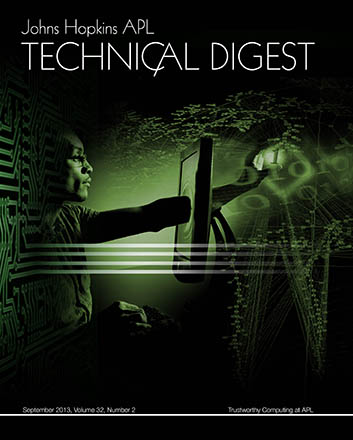
Trustworthy Computing at APL
Volume 32, Number 2 (2013)
In the 21st century, cyberspace has emerged as the foundation for a new way of life and a new approach to warfighting. We are in the early stages of conquering this man-made space, just as humanity has conquered the sea, air, and outer-space domains in previous centuries. This issue of the Johns Hopkins APL Technical Digest describes the use of formal methods, software analysis, new languages, new hardware, and new protocols to derive the principles and define the techniques of trustworthy computing that will allow the safe use of cyberspace.
Trustworthy Computing: Making Cyberspace Safe—Guest Editor's IntroductionSusan C. Lee |
Verification of Stack Manipulation in the Scalable Configurable Instrument ProcessorJ. Aaron Pendergrass |
Applying Mathematical Logic to Create Zero-Defect SoftwareYanni Kouskoulas and Peter Kazanzides |
Formal Methods for Robotic System Control SoftwareYanni Kouskoulas, André Platzer, and Peter Kazanzides |
Theory and Practice of Mechanized Software AnalysisJ. Aaron Pendergrass, Susan C. Lee, and C. Durward McDonell |
LKIM: The Linux Kernel Integrity MeasurerJ. Aaron Pendergrass and Kathleen N. McGill |
Ensuring the Integrity of Running Java ProgramsMark A. Thober, J. Aaron Pendergrass, and Andrew D. Jurik |
Analysis of Virtual Machine Record and Replay for Trustworthy ComputingJulian B. Grizzard and Ryan W. Gardner |
Trusted Platform Module EvolutionJustin D. Osborn and David C. Challener |
Trusted Mobile Devices: Requirements for a Mobile Trusted Platform ModuleKathleen N. McGill |